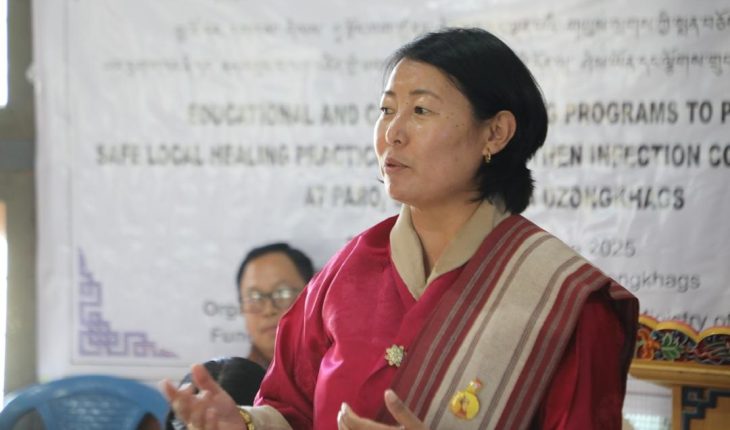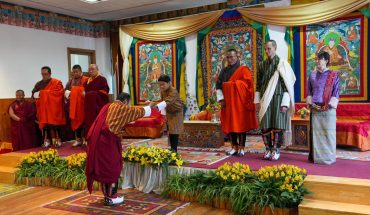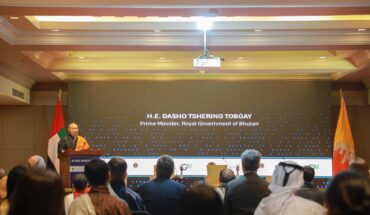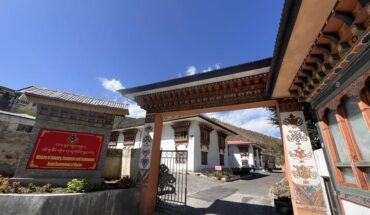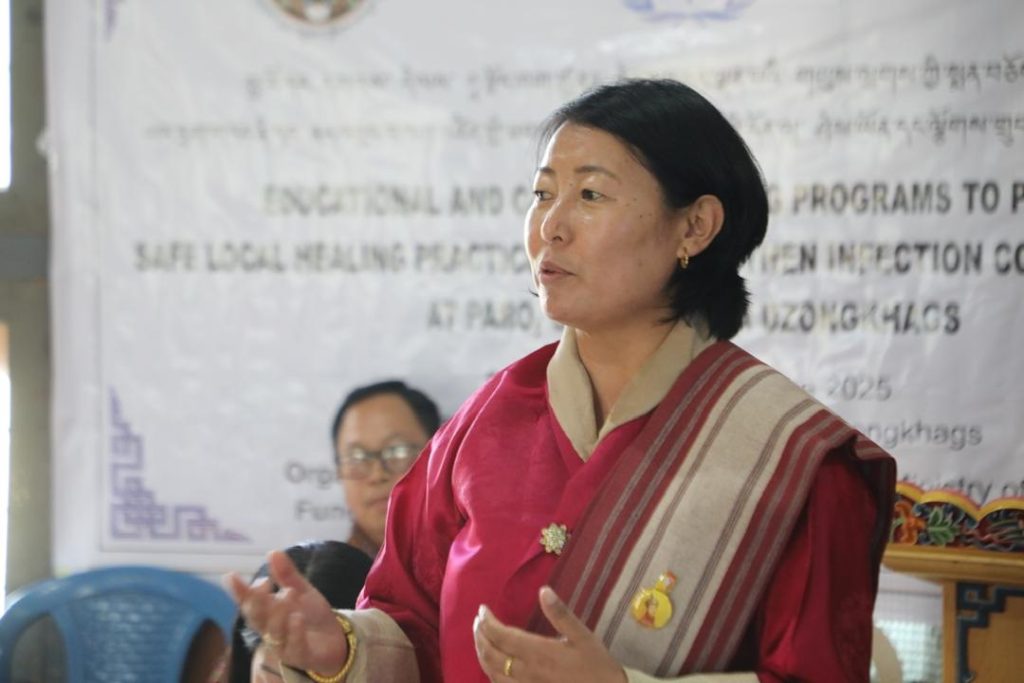
Hungrel’s Gup Sherab Lhamo Redefines Grassroots Leadership in Paro
TENZIN LHAKI |Paro
In the quiet village of Hungrel, Paro, change is taking root. Where men once dominated village halls and policy meetings, a woman’s leadership is now rewriting the story of local governance. Gup Sherab Lhamo is leading with pragmatism and a powerful belief: that women’s voices are not just needed in governance—they are indispensable.
“We used to think only men could lead,” said Tshering Dorji, a 35-year-old farmer from Hungrel. “But seeing Sherab Lhamo as our Gup has changed that belief. She listens to us, works with us, and makes decisions that truly reflect everyone’s needs.”
When Sherab Lhamo first decided to contest the Gup election, scepticism followed her campaign. “Many people still believe that only men can lead,” she recalled. “Some said if a woman becomes a Gup, it’s impossible for her to lead effectively.”
But women in her community saw potential where others saw risk. They encouraged her to run — not only for herself but for every woman who had never been given the chance to lead.
“Firstly, I noticed that there are fewer women representatives in local governance,” she said. “Secondly, women in my community encouraged me to enter this field so that we could show that women can work and compete alongside men.”
Her victory was more than electoral — it was cultural. Since taking office, Sherab Lhamo has ensured that women are not just present but powerful decision-makers. Out of seven local government members in Hungrel Gewog, four are now women — including the Mangmi and two Tshogpas.
“Leadership should reflect both genders,” she said. “If decisions are made only by men, they reflect only men’s perspectives.”
Among the women leaders working alongside Gup Sherab Lhamo is Mangmi Yuden, who said the Gup’s leadership has redefined her understanding of women’s roles in governance.
“For me, Gup Sherab Lhamo has always been someone to whom I can look up,” said the Mangmi. “She gets along very well with the people of our community, and she is considered a role model by the young women. Through her responsibilities, she has proven her worthiness as a woman in an era where women were often looked down upon.”
Mangmi Yuden acknowledged that gender stereotypes remain one of the biggest challenges for women leaders.
“People still believe that only men can take up vital responsibilities,” she said. “But with the change in time, women just need to come forward and prove their capabilities by taking on roles like men and working alongside them.”
She added that inclusive decision-making is a priority under Gup Sherab Lhamo’s leadership.
“For decision-making in the Gewog, both men’s and women’s views are vital. Where men cannot reach with their ideas, women play their part — and where women cannot support physically, men do those works. Both are equally important for community decisions.”
Beyond gender equality, Gup Sherab Lhamo’s governance has focused on practical, community-driven solutions. Her top priorities have been tackling water scarcity and improving farm road connectivity — two issues central to the gewog’s agricultural livelihood.
“For sustainability and self-sufficiency, agriculture needs to be strengthened,” she explained. “We cannot rely only on the gewog’s annual budget, so I’ve reached out to NGOs and government agencies for support.”
Recognising that water shortages affected both productivity and women’s workload, Sherab spearheaded a solar water pump project in collaboration with the Bhutan Trust Fund for Environmental Conservation (BTFEC). The project channels irrigation water from nearby Shari Gewog, transforming farmland once parched by drought.
“Since women are more engaged in fieldwork, water shortages affect them the most,” she said. “This project not only reduced their workload but also helped increase crop yields.”
Mangmi Yuden noted that the initiative had a profound impact, particularly for women farmers.
“As the water source of our community is at Shari, we used to wait until they were done with their paddy cultivation to get water for our fields,” she explained. “This was very difficult, especially for women farmers who had to fetch water from far away. The solar water pump project has greatly eased our lives.”
According to 38-year-old Chimi Dema, a farmer and mother of three, “Before, our fields were dry, and we had to carry water from far distances. Now, with the solar water system, we can grow vegetables year-round. The Gup has really brought visible change.”
Tshogpa Karma Om of Chhubjagkha shared that Sherab Lhamo’s leadership has transformed perceptions of women’s abilities in governance.
“In our country, there has always been a gender stereotype where men were always elected as local leaders,” said Karma Om. “When Sherab Lhamo was elected as Gup, I was very excited. The way she handles every single challenge inspired me as a woman to come forward and prove that we are also capable of leading.”
She said that Gup Sherab Lhamo’s example has encouraged more women to speak up in public forums.
“As a woman leader, she has never been biased toward anyone. She gives her best to help everyone in need. Her confidence and worthiness inspire other women to come forward and share their ideas during gatherings and events.”
Karma Om observed that villagers’ perceptions have shifted significantly since Sherab Lhamo took office.
“The ideas and innovations she introduced in sanitation and community have changed how people perceive women. Even the elderly citizens now believe in women’s capabilities. Many have said they don’t regret electing her as the local leader.”
However, both Tshogpa Karma Om and Mangmi Yuden admitted that balancing home and public duties remains a challenge for women in leadership.
“As a Tshogpa and a mother, I have to nurture my families and take up community responsibilities, which sometimes hinders my capability,” Karma Om shared. “Some people doubted me, but with inspiration from Gup Sherab Lhamo, I’ve overcome the challenges, and now I am able to manage both duties.”
Gup Sherab Lhamo also acknowledged these social expectations.
“As women, people expect us to manage both the home and office,” she said. “Cultural norms — what we can or cannot do — still hold us back.”
Yet, her approach has not been to reject tradition but to reform it from within — by involving men and elders in the transformation.
“Community elders and men should advocate for and encourage young girls,” she said. “The olden days are different from modern times. Now, both men and women must share leadership roles.”
Men in Hungary have also started to recognise that shared leadership strengthens the community.
“Earlier, decisions were mostly made by men,” said farmer Tshering Dorji. “Now, with women in leadership, meetings include new ideas and empathy. It feels more balanced.”
Both the Mangmi and Tshogpa agree that women’s voices make a tangible difference in community planning and development.
“In the past, people didn’t trust women’s ideas,” said Karma Om. “But now, after seeing Gup Sherab’s leadership, they have started believing in women’s capabilities. The people of Hungrel Gewog are now hoping for more women to take part in future elections.”
Mangmi Yuden expressed similar optimism. “As of now, we only have four women local representatives from Paro Dzongkhag, but we’re giving our best so that women in the future can look up to us,” she said. “To encourage more women, we need financial support from NGOs and the government to conduct awareness programmes and trainings.”
Her vision is clear: “In the upcoming years, I am hoping for at least 50 percent of women’s participation in local government elections.”
Sherab Lhamo continues to advocate for stronger collaboration between local governments, NGOs, and media to sustain gender inclusion.
“We need continuous awareness campaigns to show that girls can lead,” she said. “With support from NGOs and the government, women can take the front line in every sector.”
Her leadership offers a replicable model — one where rural innovation, gender awareness, and institutional partnerships converge to create lasting impact.
“For true development and welfare, ideas from both men and women are vital,” she emphasised. “Only when both genders contribute can we achieve balanced progress.”
As Bhutan continues to bridge its traditions with modern democratic values, Hungrel Gewog stands as a powerful example of how constructive leadership can transform both mindsets and livelihoods.
“There is nothing we cannot do,” said Gup Sherab Lhamo. “We should come forward and at least participate. Don’t hold back thinking that it’s because we are women.”

